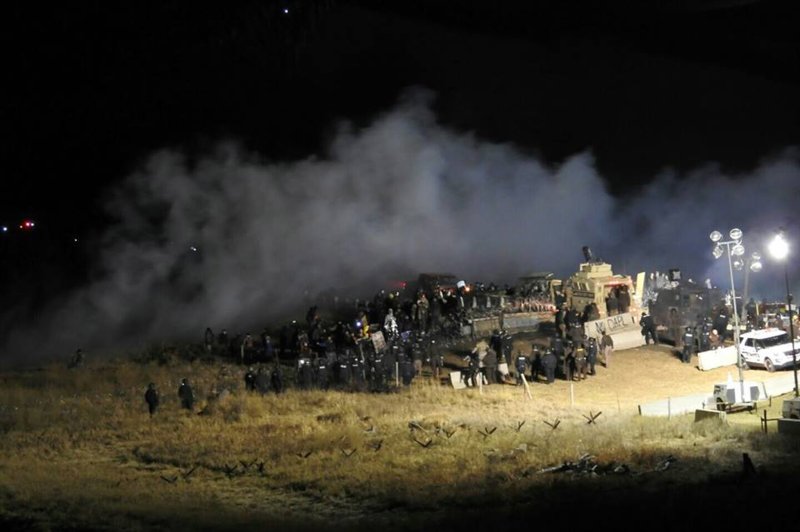1 of 3 | Police and protesters clash on the Backwater Bridge, north of a protest camp in North Dakota’s Morton County on November 20, 2016. Photo courtesy of Morton County Sheriff’s Department
Feb. 24 (UPI) — Jury selection began Monday in Dakota Access Pipeline’s $300 million lawsuit against Greenpeace USA.
A federal lawsuit by the company was dismissed but there is a similar one filed in North Dakota state court in 2019.
The trial will take place in Mandan, N.D., which is near Bismarck.
The jury will include local residents in a state where oil is a major industry. The trial is expected to last about five weeks, NPR reported.
Greenpeace USA says if it loses the case, the organization “could face financial ruin, ending over 50 years of environmental activism.”
The lawsuit filed by Dakota Access, which is a subsidiary of Texas-based Energy Transfer, claims Greenpeace and others engaged in an “unlawful and violent scheme to cause financial harm to Energy Transfer, physical harm to its employees and infrastructure, and to disrupt and prevent Energy Transfer’s construction of the Dakota Access Pipeline.”
Greenpeace USA said it uses “peaceful protest and creative communication to expose global environmental problems and promote solutions that are essential to a green and peaceful future,” according to the news release.
Greenpeace said the lawsuit is designed to silence free speech.
“This case is a prime example of corporations abusing the legal system to silence critics and keep their operations secret,” Sushma Raman, Greenpeace USA interim executive director, said in a news release. “It is also a critical test of the future of the First Amendment – both freedom of speech and peaceful protest — under the Trump Administration and beyond. But we are fighting back, and we are not fighting back alone.”
More than 430 organizations signed an open letter to Energy Transfer, including 350.org, Public Citizen, ACLU North Dakota, SEIU, Indigenous Environmental Network and Amnesty International USA along, with public figures such as Billie Eilish, Jane Fonda, Adam McKay and Susan Sarandon. Also 350,000 individuals from around the world weighed in.
Dakota Access Pipeline, which transports fracked crude oil to refineries and global markets, has been operational since 2017 at a cost of $3.8 billion.
The Obama administration stopped construction in September 2016 but it was reversed after President Donald Trump took office in 2017.
The pipeline moves crude oil 1,172 miles from the oil fields of North Dakota to a pipeline hub in Patoka, Ill.
Most of the controversy focuses on a small section, south of Bismarck, N.D., that crosses under a reservoir on the Missouri River. It’s near the Standing Rock Sioux Tribe’s reservation.
The tribe said it wasn’t adequately consulted in the federal planning process, the construction crossed sacred sites and that the pipeline is a pollution risk to its water supply.
In the lawsuit, Energy Transfer claims Greenpeace lied about the company’s work to solicit donations to organize and fund protests, including “violent attacks on Energy Transfer employees and property.”
“Everybody is afraid of these environmental groups and the fear that it may look wrong if you fight back with these people. But what they did to us is wrong, and they’re going to pay for it,” Dakota Access Pipeline co-founder Kelcy Warren said.
Greanpeace denies the allegations, saying its role in the protests that began in April 2016 and ended in February 2017 were limited and led by Native American groups.
Several hundred people were arrested and hurt in the demonstrations.
The National Guard and law enforcement officers ultimately evicted the remaining protesters. Tear gas, rubber bullets and water sprays were used on protesters.
